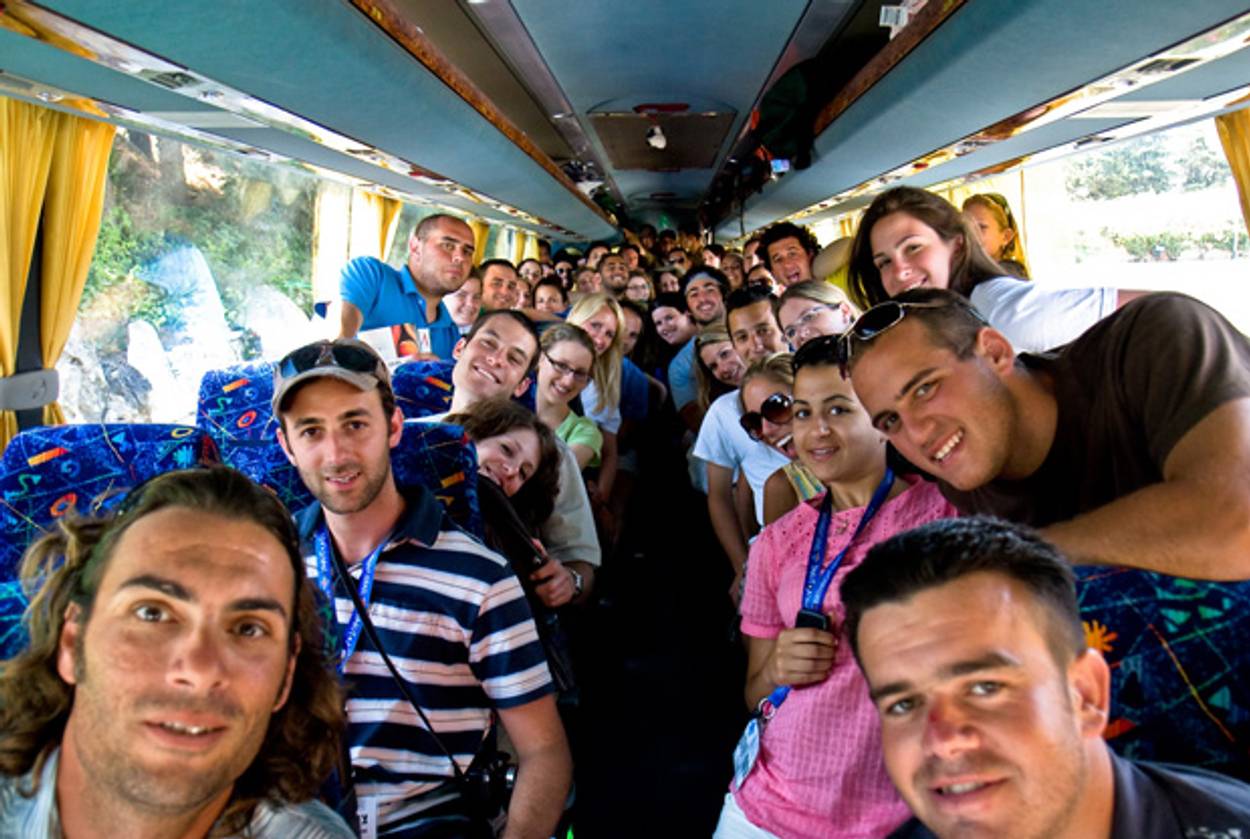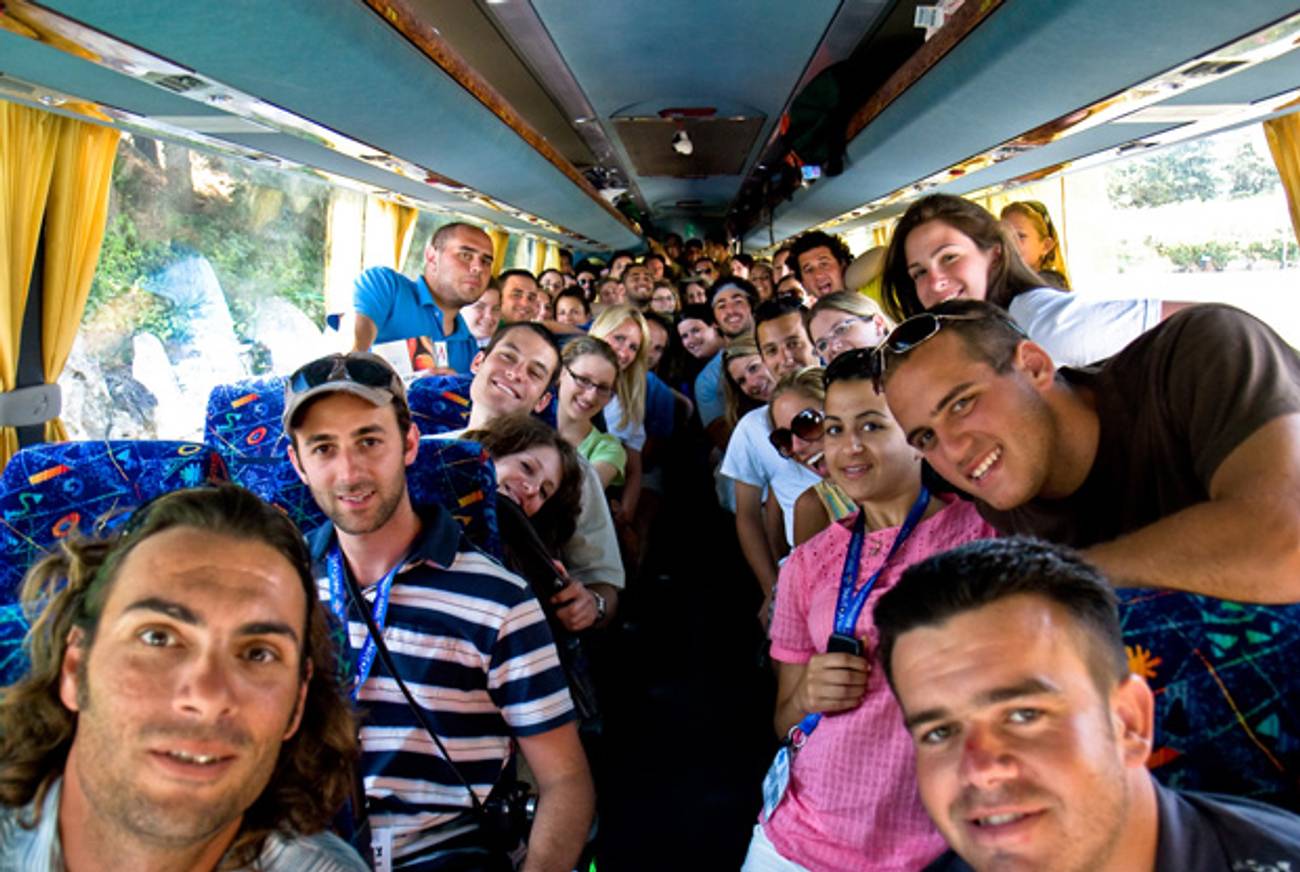Tablet Is Going to Israel
Birthright Israel will take 40,000 young Jews on a free trip to the Jewish state this year. We’re joining them.




Here is what it means to celebrate your bar mitzvah if you are Taglit-Birthright, the organization that provides free tours of Israel to young Jews from around the world. It means going from an annual budget of roughly $15 million in 1999, the first year in which Birthright operated trips, to one of $119 million—$34 million of which is provided by the Israeli government. It means going from 2,000 private donors to 25,000. It means going from bringing 10,000 Jews aged 18 to 26 to bringing somewhere in the neighborhood of 40,000 this year.
“This is the best age for anybody to decide on his or her future,” Gidi Mark, Birthright’s CEO, explains of that magical 18-to-26 gap. “Here is the ‘wilderness’—you ask yourself where you go. You’re looking for answers. And Israel is an option—not the only option, but a relevant option.”
The bold-faced names of the Jewish philanthropic world—Charles Bronfman, Michael Steinhardt, Sheldon Adelson, Lynn Schusterman—believe it’s more than relevant. They’ve bet their money—more than $60 million just this year comes from private donors in North America—on the proposition that 10 days in Israel, crammed on a bus with dozens of other young Jews with all expenses paid (including the flights there and back), is an effective stop-gap measure for what many see as a crisis of Jewish continuity in the Diaspora.
With their support, Birthright is celebrating its bar mitzvah year by thinking even bigger: By 2013, it aims to bring 51,000 Jews—more than half of the roughly 100,000 born every year (including Israelis)—to Israel. And it aims to make that figure a new plateau, so that it can look back from 2022 and know that a majority of eligible Jews have participated.
Ultimately, Birthright’s most notable achievement might be that it has achieved the status of household name—at least among American Jewish households. Jews from nearly 60 countries have gone to Israel through Birthright, but this year, approximately 70 percent of them will be from the United States. If you’re an American Jew, there’s a good chance you, your son, your granddaughter, your nephew, your cousin, or your best friend has gone on Birthright.
But what really goes down during those 10 days? Left-wing articles criticize the program for indoctrinating participants with a right-wing political agenda; participants offer unreliable anecdotes of hookups and hangovers.
On Monday, we (we are senior editor Bari Weiss and staff writer Marc Tracy), along with a few other Tablet Magazine staffers and 38 Jews will fly from Newark to Tel Aviv and begin our Birthright trip. Like every other Birthright participant, we’re traveling on Birthright’s dime. We hope our trip will be like every other Birthright trip except for the fact that we’ll be blogging it every step of the way.
We’re calling it the Roll, and as our bus churns along we’ll be bringing you updates on what we are told at the top of Masada, in the shadow of the Western Wall, and at the Lebanese border; profiling the American participants and the Israeli soldiers who join us; and telling stories about what goes on after the sun sets.
Quite apart from our daily commentary about Israeli politics—about the peace process; the crisis with Iran; the increasing role of Haredi and Russian political parties; etcetera, etcetera, etcetera—Birthright is a story in and of itself. And we intend to cover it in a way it literally never has been covered before.
There are a couple of things we’ll be looking for. First: Is it fun? It seems hard to believe it won’t be. Among other things, we’ll float in the Dead Sea, spend a night in a Bedouin tent in the desert, and go to Tel Aviv. Our trip is a so-called “Extreme” trip—there’s apparently a lot of hiking—so we’re even looking forward to treating Shabbat as the day of rest it is commanded to be (among other things, we will be at the Kotel at sundown Friday). “We believe that you can give education, information, and still be fun,” says Mark, a tall, fit man with only some gray in that trademark close Israeli haircut. “That brings images of Jews who ‘suffered’ for so many years on Sunday school. And you ask why it is so successful? This is the first answer.”
Second: What are the soldiers like? Central to any Birthright trip, according to Mark, is the Mifgash, the encounter with Israeli soldiers our age, who will greet us in uniform and spend their remaining five days out of it. For Mark, the Mifgash is at least as important for the Israelis, many of whom possess as much experience—little to none—with Diaspora Jews as Diaspora Jews have with Israelis. “Our trips are about building a Jewish community,” he argues.
Third: What’s the political bent? In a Nation article last year, journalist Kiera Feldman reported that Birthright had initially been the brainchild of left-wing Zionists like Yossi Beilin concerned with intermarriage statistics (an infamous 1990 study that Mark also cited found that the majority of American Jews intermarried). However, Feldman argued, right-wing funders have altered the group’s mission. “What began as an identity booster,” she wrote, “has become an ideology machine, pumping out not only Jewish baby-makers but defenders of Israel. Or that’s the hope.”
But the only change Mark identifies is the Israeli government’s approach: from wanting—20 and 30 years ago, from various Birthright precursors—more Israelis to wanting more Jews who identify with Israel. As for politics? “There is a political agenda in the sense that we try to connect you to where your people came from and show you where the Jewish people came from. We are not shy about the fact that the Jews have the right to a state like every other people,” Mark says. “But we try to give right and left. There are sometimes speakers from the left, and [tour educators] have instructions to balance it before or after, or vice versa. If you have someone from the Likud, the tour educator is instructed to say, ‘Look, this person is 1 2 3, and in Israel there is also 4 5 6.’ ”
He adds: “You cannot brainwash people who are intelligent.” Reading our dispatches, you, dear reader, will get to be the judge of that.
Fourth: What really goes on? Is everything on the trip kosher? (We’ll abandon euphemism for a moment and refer you to this Vice article, “I Gave a Handjob at Jew Camp.”) Birthright’s policy about what goes on after the day is done is half “Don’t ask, don’t tell” and half “Don’t.” Says Mark: “We cannot control each one of our participants. We trust their good intentions.” At the same time, while visiting Birthright’s U.S. headquarters a couple blocks from the Empire State Building, one of us saw one of its original recruitment posters. Above a photograph of a short, Semitic-looking boy, basketball in hand, dwarfed by two taller teammates on either side, it reads, “Sometimes it’s hard being Jewish.” The second photograph shows a different Jewish boy, this time flanked by two Jewish girls, around whom he has his arms. Caption: “Sometimes it isn’t.” This is the aspect of the trip, the part where you put your arm around your fellow participants (or if you’re really lucky, a soldier), that is perhaps the most tantalizing for many of the trip-goers currently packing their bags—and, if you follow the narrative to the end, it ultimately may be right in line with both the goals of Birthright’s funders and God’s promise that Abraham’s descendants shall equal the number of stars in the sky.
On our blog, the Roll, you’ll get to hear it all. We’ll be back Monday from the airport.
***
Like this article? Sign up for our Daily Digest to get Tablet Magazine’s new content in your inbox each morning.
From the editors of Tablet Magazine.